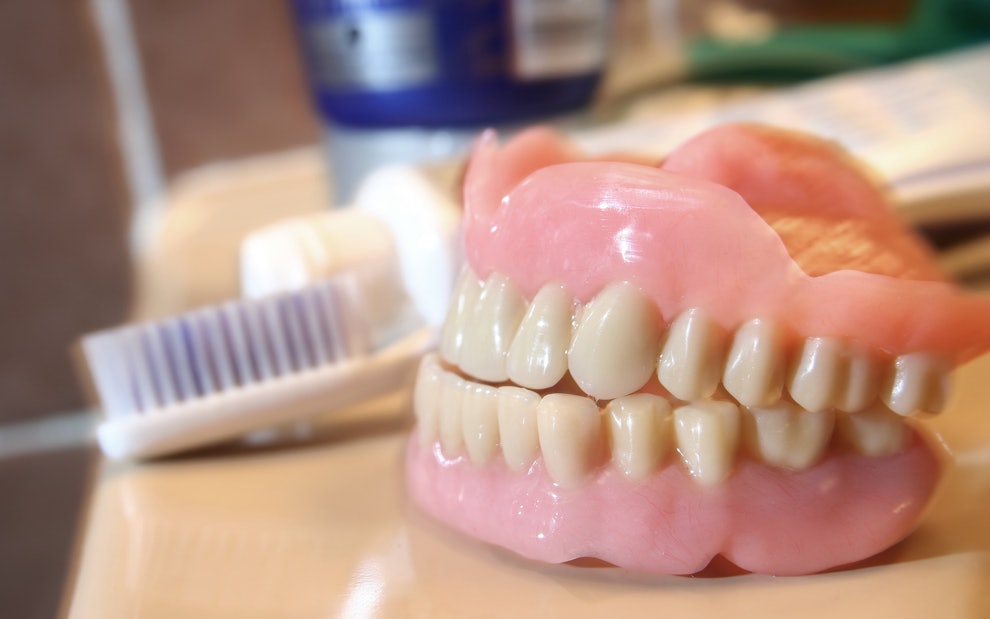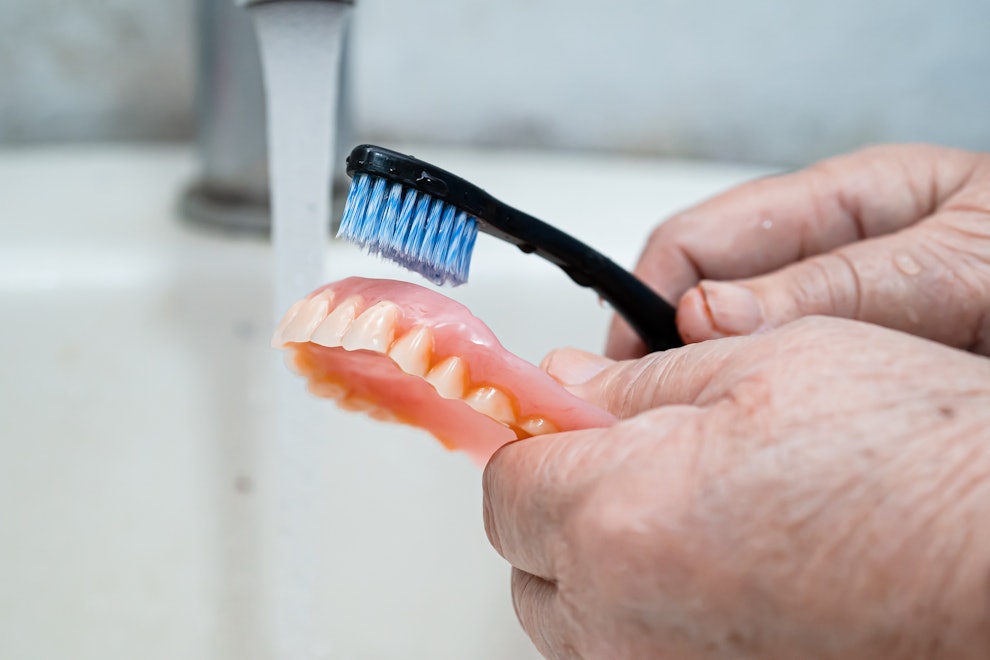Article at a glance
Dentures are a popular and effective way to help restore function for those who are missing one or more teeth.
Proper denture care is vital to keeping your mouth healthy and ensuring you get the most out of your dentures.
You can practice proper dental care with an ADA-approved denture cleaner and a denture brush.
Daily cleaning of your dentures and your mouth can help you avoid complications such as inflammation, discomfort, and pain.
Review the American College of Prosthodontists’ list of indications for when you need to replace your dentures.
Regular checks up with your dentist are important for keeping your mouth healthy and helping ensure your dentures fit well and last many years.

Dentures replace missing teeth and help restore biting and chewing functions. The American Dental Association (ADA) estimates that more than 36 million U.S. adults have no teeth. More than 90% of them have dentures. Some 120 million Americans are missing one or more teeth.
Everyone’s mouth is different. Dentists and prosthodontists (dentists who work with dentures) customize dentures for each patient to accommodate factors such as the number of missing teeth, the degree of bone loss, affordability, and what is most comfortable for the patient. Dentures are made from a variety of materials including nylon, resin, porcelain, acrylic, or metal. The type of denture determines the type of material required. It’s important to remember that these materials are destructible. Dentures need regular cleaning with the right cleaners.
Why Denture Care is Important
The best approach to denture care is to treat your dentures as carefully as you would your teeth. This means keeping them as clean as you can. It’s a good idea to clean your dentures at least once a day, and if possible, every time you eat.
Cleaning your dentures can help prevent stains. It also helps prevent a buildup of plaque and calculus, which can cause issues such as denture-related stomatitis, also known as thrush. Thrush causes pain, inflammation, and sores in and around the mouth. It also puts you at risk for fungal and bacterial infections in your mouth. What’s more, correct denture hygiene will protect your dentures from warping, discoloration, staining, and scratching.
Tips for Caring for Your Dentures

There are many products available to clean your dentures, including a specially designed denture brush and denture tablets. When looking for a denture cleaner, look for the ADA Seal of Acceptance. This seal shows that the American Dental Association Council on Scientific Affairs evaluated this product to make sure that it is both safe and effective for cleaning dentures.
When a company wants to get the ADA Seal of Acceptance for denture cleaning products, they must show that their product:
Does what they claim it does
Poses no risk to the consumer when used as directed
Won’t damage the denture
To help your dentures stay clean and last longer, follow the tips below.
Always Handle Carefully
If you drop your dentures, you risk them cracking or breaking—especially if you drop them on hard surfaces like bathroom sinks or floors. When you clean your dentures, it helps to hold them over a towel or a bowl of water to cushion the fall if you drop them.
Don’t Let Dentures Dry Out
When dentures dry out, they can crack or split. Storing your dentures in a liquid will also help them keep their shape. Keep your dentures in water or a cleaning solution when you’re not wearing them.
Rinse After Eating
Some foods get stuck on or in between teeth, and they can also get stuck to your dentures. If you eat sticky or tough foods like peanut butter or jerky, give your dentures a rinse after eating to dislodge any food that might adhere to them.
Clean Daily
Daily cleaning with a denture cleaner and brush is vital for keeping your dentures fresh and prolonging their life. To clean your dentures, brush with a soft-bristled toothbrush or denture brush to remove food and buildup. You can use a non-abrasive toothpaste or denture paste to clean your dentures. Remember to clean the grooves that touch your gums as well, especially if you use a denture adhesive.
You can also use a water flosser or waterpik to get into difficult-to-reach spaces and to add a little extra power to your cleaning. These tools are effective but gentle on your dentures.
Keep Your Mouth Clean
After you clean your dentures, clean your gums and the inside of your mouth to remove any lingering adhesive, food, or buildup. If you use a partial denture, brush the remaining teeth, too. Do not use denture cleaner in your mouth as this can cause irritation.
You can also use a soft-bristled toothbrush or gauze to clean your tongue, the roof of your mouth, and the inside of your cheeks. This will help remove any lingering bacteria and keep your mouth feeling fresher.
Soak Overnight
It’s very important not to let your dentures dry out so they don’t become brittle and susceptible to cracking. When you sleep, remove your dentures and soak them overnight. You can use a denture cleaning solution, denture tablets, or water to keep them moist.
Remember to thoroughly rinse your dentures before putting them back in your mouth. Some denture cleaners use chemicals that can irritate or inflame your mouth.
Make Sure They Pit properly
Dentures that don’t fit correctly can cause tenderness, pain, and oral sores. If you find your dentures are uncomfortable to wear or that they’re hurting you, contact your dentist to make sure that they fit properly.
Get Regular Dental Checkups
Regular checkups for dentures are just as important as regular checkups for natural teeth. These checkups will help keep your dentures and your mouth healthy, and you can talk to your dentist about any existing or new issues.
Substances To Avoid
While dentures are hardy and can withstand a lot of use, certain things can negatively affect their use and how long they last.
Bleach Products
Bleach is especially bad for dentures. It weakens denture materials. Don’t be tempted to bleach your dentures to get rid of stains — it won’t work, and it can actually cause further discoloration. Bleach also corrodes the metals used in some dentures.
Abrasive Cleaners
Abrasive toothpaste and hard-bristle brushes will scratch your dentures. Scratches collect food particles and microorganisms that will damage and discolor your dentures.
Hot Water
Hot water, especially boiling water, will soften and warp your dentures.
When To Replace Your Dentures

Your mouth can change over time. This could be because of shrinking gums or bones. If this happens, you’ll need replacement dentures to ensure a comfortable fit. The American College of Prosthodontists has developed a list of indications to watch for. When you experience the following, it might be time for a replacement:
Constant or repeated inflammation or irritation
Needing to use adhesives more than once a day
Struggling or reluctance to wear dentures
Degraded denture material
Cracked, broken, or missing teeth from the denture
Discoloration
Your existing natural teeth have changed
Your dentures are more than five years old
Dentures have revolutionized oral care. They’ve made it possible to restore function to those with missing teeth and have also improved people’s confidence in how they look. If you wear dentures, it’s important to remember that dentures need care to keep them working properly and to ensure they last.
Worried about how your dentures fit or concerned that they’re causing discomfort? Contact your dentist for advice on the best way to care for your dentures and tips on giving your mouth the treatment it needs to stay fresh and healthy.
Sources
https://www.ada.org/resources/research/science-and-research-institute/oral-health-topics/dentures
https://www.prosthodontics.org/about-acp/position-statement-the-frequency-of-denture-replacement/
https://www.mayoclinic.org/denture-care/expert-answers/faq-20058375
https://www.ada.org/resources/research/science-and-research-institute/ada-seal-of-acceptance
https://www.dentaly.org/us/dentures-false-teeth/denture-care/
https://www.dentaly.org/us/dentures-false-teeth/new-dentures/
https://my.clevelandclinic.org/health/articles/10901-denture-care
Become a patient
Experience the Oak Street Health difference, and see what it’s like to be treated by a care team who are experts at caring for older adults.



